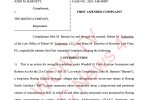As U.S. hotels try to lure a shrinking number of business and leisure travelers, the industry appears to have adopted a new motto – “Better cheap than empty.”
But as hotels slash rates and offer sweet deals to fill empty rooms during the recession, they may regret their largess if customers get permanently spoiled by cheap lodging.
“There will be a resetting of rates and rate expectations for the foreseeable future,” said Bjorn Hanson, lodging industry expert at New York University. “Even less expensive hotels will have to compete on rate more than they have already.”
Average daily rates have dropped 8 percent year over year for the U.S. hotel industry, according to PKF Consulting, and major hotel operators have made it easier for their rewards program members to rack up points and free nights.
Through August, Marriott International is offering one free night with three paid stays at certain hotels. Starwood Hotels & Resorts is offering a free weekend night for every two paid nights through September, with no blackout dates.
Offers like these can recalibrate what leisure travelers expect to pay for travel and hotels, some experts say.
Compounding the problem, many companies are — or soon will be — negotiating corporate hotel rates for up to three years. As market prices falter, those companies will lock in lower rates by reserving facilities for future conventions and meetings.
The challenges to leisure and business travelers’ room rates do not bode well for hotels’ revenue per available room (RevPAR). By some estimates, RevPAR, the industry’s key metric of profitability, won’t reach last year’s levels until 2013, well after the point where analysts expect the resumption of economic growth.
“We had such big decreases,” said John Fox, consultant with PKF Consulting. “It will take four to five years to get back to where we were.”
IS THE PRICE RIGHT?
Hotels can close off rooms and floors, but they don’t have the level of flexibility to cut capacity that airlines and cruise lines enjoy.
One lever they employ to deal with fluctuating demand is raising and cutting room rates on a daily basis. This works well in boom times but can hurt results during recessions and economic slumps. After the 2001 recession, it took hotels three years to return rates to their pre-recession levels, closely followed by a rebound in RevPAR.
But hotels did not see the same plunge in corporate spending then as they are seeing now.
The cutback in corporate travel is particularly painful for hotels; business travelers provide the bulk of hotels’ revenue and book about two-thirds of overall room nights.
“The post-9/11 cycle was very isolated and business travel returned much faster because the financial services sector was healthy, or certainly healthier than it is today,” said Scott Berman, analyst with PricewaterhouseCoopers.
Now, political criticism of business spending has made corporate executives wary of meeting in “places that are fun,” Berman said.
The hotel industry has seen RevPAR fall for nine straight months through April, according to Smith Travel Research. And when May figures are finalized this week, they will likely show a 10th month of declines.
Analysts watching weekly RevPAR data have recently noted some stabilization in transient rooms — rooms occupied by corporate, government or foreign guests. But demand among group travelers, a segment that typically reserves rooms up to three years out, remains weak.
“There’s no question that the group segment has leverage more so than the leisure rates,” Berman said.
And then there is the outlook for hotels’ profits.
Some argue erosion in rates will not only have a more lasting impact on hotels’ RevPAR, but could also mean a drop in profit.
“Lower occupancy you can somewhat offset with lower costs, but lower rates go straight to the bottom line,” said Chris Woronka, analyst with Deutsche Bank.






















